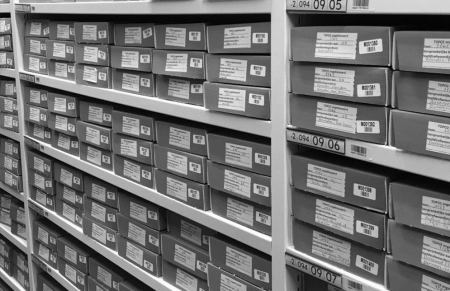Archive auditing for arts organisations
Together with CEMPER, we organise archive audits for the arts sector – processes that are part of TRACKS and have been organised since 2015. Organisations in the performing arts and musical sectors can rely on us for support with their archive and collection management.
Challenge
Music and performing arts organisations with long-term funding from the Arts Act must take the basic preservation guidelines for archive management into account. But many organisations encounter certain issues here, which is why we’ve developed an archive auditing process together with CEMPER as an extension to the work carried out by TRACKS.
TRACKS is comprised of a set of tools that help artists and arts organisations with their archive and collection management. It’s a collaboration between meemoo, Letterenhuis, CEMPER, CKV (Museum of Contemporary Art Antwerp), Kunstenpunt (Flanders Arts Institute), VAi (Flanders Architecture Institute), Archiefbank Vlaanderen, AMVB (Archive and Museum for the Flemish Living in Brussels), FARO (Flemish Institution for Cultural Heritage) and Flanders Department of Culture, Youth and Media.

Rijk Willemse - CC BY-SA-NC
Our role
We provide sound advice to assist digital heritage managers within the arts sector. Our aim is to support them with the necessary knowledge and tools, so they can perform their tasks in the best way possible. We do this both on an ad hoc basis in response to specific requests, as well as via a broader archive auditing process. In the latter case, we examine all the archiving operations together with CEMPER.
We’re providing our digital heritage expertise in this project and supporting organisations primarily with the digital aspects of their archive management. CEMPER is focusing more on the general and analogue aspects.
Approach
We started these auditing processes in 2015, and since 2021 are running two new audits every year. Which performing arts and music organisations have followed this auditing process in the past? Below you can find a handy overview.
2015-2016 | CAMPO Needcompany deSingel Toneelhuis ARSENAAL/LAZARUS |
2016-2017 | Compagnie Cecilia Theater Antigone Walpurgis Theater Zuidpool wpZimmer |
2017-2018 | het nieuwstedelijk KVS Voetvolk Theater Utrecht Digitaal Erfgoed Nederland (DEN) |
2019-2020 | Alamire Foundation De Centrale Cohort Festival van Vlaanderen Mechelen/Kempen Oxalys Sfinx Festival |
2021 (first half) | AMUZ B‑Classic De Studio Villanella Democrazy fABULEUS Het Depot Irene Wool Zefiro Torna |
2021 (second half) | Antwerp Symphony Orchestra A Two Dogs Company Brussels Jazz Orchestra Damaged Goods HERMESensemble KRAAK Workspace Brussels tg STAN |
2022 (first half) | Symfonieorkest Vlaanderen Dranouter muziekcentrum Festival van Vlaanderen 2021 Het Gevolg LOD muziektheater MA Festival Martha!tentatief MT De Kolonie |
2022 (second half) | MetX Trix Muziektheater Transparant Symfonieorkest Vlaanderen |
2023 (first half) | Aifoon BERLIN HETGEVOLG |
2023 (second half) | Action Zoo humain Aubergine Artist Management BRYGGEN Kunstenfestivaldesarts Monty |
2024 (first half) | laGeste 4Hoog Grip Rataplan vzw het TheaterFestival Zonzo Compagnie |
Type of audit and timing
The basic archive management guidelines form the starting point for the auditing processes. We always set up a group process that runs for several months, which allows artists and arts organisations to share their archive management experiences and challenges. Spreading the process over several months means we can work in greater depth and achieve better results. Participants also become more aware of the importance of archive management across the whole sector.
Setting up the process
We start by conducting a survey to assess the current state of affairs. How are participating organisations dealing with the various aspects of their archive management? We start by looking at the practice and then apply the theory, setting four deadlines with the organisations to give interim feedback. During and after the process, we determine what actions the organisations can take which they should prioritise.
The archive auditing process consists of the following stages:
a preparatory assignment for the organisations;
a launch meeting;
a four-part survey with interim question-and-answer sessions to serve as a basis for determining the archive operations currently in place;
meemoo and CEMPER site visits to the organisations;
a final meeting;
further following up.
Partners
We organise these processes in collaboration with CEMPER.
- T • +32 9 298 05 01
- M • bart.magnus@meemoo.be

